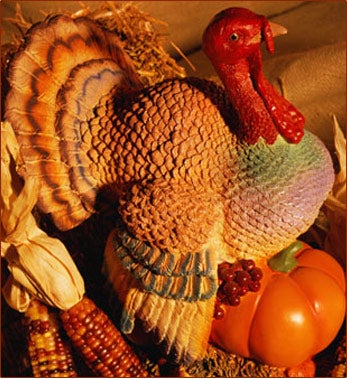- Valentine's
- Flower Type
- Signature Collections
- More Ways to Shop
 Delphinium >
Delphinium >
- Occasions
- Lifestyle
 Money Tree >
Money Tree >
- Keepsakes & Personalized
 Chocolate Covered Strawberries >
Chocolate Covered Strawberries >
Don't have an account?
Click HereSurprise your friends and family this holiday with your new found knowledge about Thanksgiving!
Let's talk turkey!
Americans feast on 535 million pounds of turkey on Thanksgiving. According the U.S. Department of Agriculture, more than 45 million turkeys are cooked and eaten in the United States at Thanksgiving. That number represents one sixth of all the turkeys sold in the U.S. each year!
Americans feast on 535 million pounds of turkey on Thanksgiving According the U.S. Department of Agriculture, more than 45 million turkeys are cooked and eaten in the United States at Thanksgiving. That number represents one sixth of all the turkeys sold in the U.S. each year! Benjamin Franklin wanted the turkey to be our national bird. Domesticated turkeys cannot fly, however wild turkeys can fly up to 55 miles per hour over short distances. Only male (tom) turkeys gobble. Females make a clicking noise. The famous gobble is actually a seasonal mating call. The Turkey Trot, a ballroom dance in the 1900s, was named for the short, jerky steps of the turkey. It became popular mainly because it was denounced by the Vatican as "suggestive." Turkeys are known to spend the night in trees! (Maybe to escape the Thanksgiving table?) Turkeys can drown if they look up when it's raining! A turkey's field of vision is 270 degrees-one of the main reasons they're able to elude some hunters. The average person consumes 4,500 calories on Thanksgiving Day.

Giving thanks on Thanksgiving is an important American tradition, but it's not ours alone. In fact, six other nations besides the U.S. have officially declared Thanksgiving Days: Brazil, Canada, Japan, Korea, Switzerland and Argentina. Thanksgiving celebrations have also been celebrated for hundreds of years, including in some ancient cultures.
The Greeks
The ancient Greeks celebrated a festival of the harvest called Thesmosphoria each autumn. Their goddess of corn and other grains was Demeter, who was honored at the festival.
The Romans
The Romans also celebrated a fall harvest festival in honor of their goddess of corn, Ceres (where the word cereal comes from). The Romans celebrated a Thanksgiving feast where they offered the first fruits of the harvest and pigs to Ceres. Their Thanksgiving was held on October 4th each autumn.
The Chinese
The ancient Chinese celebrated their harvest festival, Chung Ch'ui, in accordance with the full moon that fell on the 15th day of the 8th month. They considered this day to be the birthday of the moon. Special "moon cakes" were baked and stamped with a picture of a rabbit to honor their belief that a rabbit is on the face of the moon. These cakes were eaten with a Thanksgiving meal during the 3-day festival. It was believed that flowers would fall from the moon during the festival and those that saw the flowers would soon receive good fortune.
The Hebrews
Jewish families also celebrate a harvest festival called Sukkoth. This autumn festival has been celebrated for over 3,000 years. Sukkoth begins on the 15th day of the Hebrew month of Tishri, 5 days after Yom Kippur, the most solemn day of the Jewish year. The holiday is named for the huts (succots) that Moses and the Israelites lived in as they wandered the desert for 40 years before they reached the Promised Land. Sukkoth lasts for 8 days and Jewish people construct temporary huts from branches with a covered roof made of with foliage that allows the natural sunlight in. Fruits and vegetables, including apples, grapes, corn and pomegranates hang inside the hut and on the first 2 nights of Sukkoth, the families eat their meals in the huts under the evening sky.
The Egyptians
The ancient Egyptians celebrated their harvest festival in honor of Min, their god of vegetation and fertility. The festival was held in the springtime, the Egyptians' harvest season, and featured a parade in which the Pharaoh took part. After the parade a great feast was held with music, dancing and sports as part of the celebration. When the Egyptian farmers harvested their corn, they wept and pretended to be grief stricken to deceive the spirit, which they believed lived in the corn.